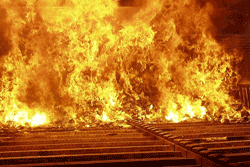Opinion: Do incinerators pose a public health risk?
 ASK is occasionally called upon to testify in planning inquiries about municipal solid waste (MSW) incinerators. Among other objections, the alleged impact of stack emissions on local air quality and human health is invariably raised, often by environmental NGOs. We briefly summarise existing legislation and standards, the scientific consensus and our own experiences of public enquiries.
ASK is occasionally called upon to testify in planning inquiries about municipal solid waste (MSW) incinerators. Among other objections, the alleged impact of stack emissions on local air quality and human health is invariably raised, often by environmental NGOs. We briefly summarise existing legislation and standards, the scientific consensus and our own experiences of public enquiries.
State of regulation
In Europe, municipal waste incineration is governed by Directive 2000/76/EC on the incineration of waste. Hazardous waste treatment is dealt with separately. The directive, which requires operators to obtain permits for incineration plants, was implemented in 2000 as one of a package of environmental policies aimed at limiting emissions of pollutants including nitrogen oxides, sulphur dioxide, dioxins and heavy metals. It regulates technical standards, operating conditions and emissions monitoring. Other European policies call for waste to be recovered or disposed of without endangering human health or the environment. The Directive applies to all incinerators from the beginning of 2006, and has been implemented in the UK through the present Pollution Prevention and Control (PPC) regime.
PPC permits are issued only if the proposed methods for monitoring emissions comply with the requirements of the directive. Permits specify categories and quantities of waste, and emission limits for pollutants. In the UK, the Environment Agency is the authority charged with issuing permits for waste incinerators and inspecting operations at existing and future plants. Emissions are monitored by operators – any breach of the emission limits must be reported to the Environment Agency along with measures for avoiding further breaches.
Where’s the evidence?
There is some evidence that poorly performing incinerators in operation up to about 30 years ago may have caused or exacerbated adverse health effects. However, because pollutant emission levels were then so much higher, there is wide consensus among scientists that these findings are not relevant to modern incineration facilities. For example, a study commissioned by the Department for Environment, Food and Rural Affairs (Defra) has examined evidence from 23 studies and four reviews of epidemiology related to Energy from Waste plants (so called because all MSW incinerators must also recover useful energy). The study, published in 2004 – two years before the Waste Incineration Directive came into force – and peer-reviewed by the Royal Society, concluded that “on the evidence from studies so far, the treatment of municipal solid waste has at most a minor effect on health in this country particularly when compared with other health risks associated with ordinary day to day living”.
Summarising, although there were problems in the past, modern MSW incinerators are subject to appropriate emission standards and inspection programmes. Despite the numerous studies that have been carried out, no link has emerged between the presence of such incinerators and ill health in the surrounding population. In our experience, a planning appeal for proposed MSW plant has never been dismissed on the grounds of air pollution.
Read more news & opinion articles in our news archive
Image: claush66
